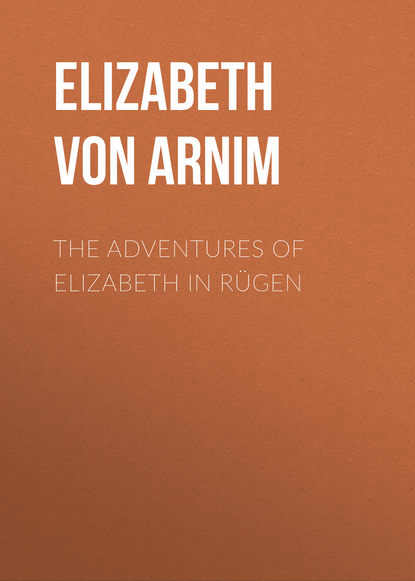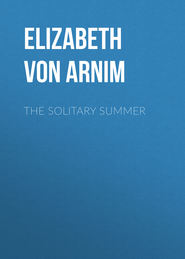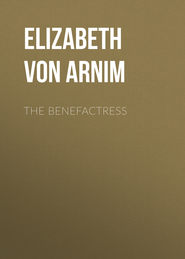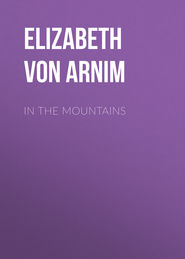По всем вопросам обращайтесь на: info@litportal.ru
(©) 2003-2024.
✖
The Adventures of Elizabeth in Rügen
Настройки чтения
Размер шрифта
Высота строк
Поля
'Oh we can't walk,' I broke in. 'We must drive because we might want to go beyond Putbus—we are not sure—it depends–'
The old man looked puzzled. 'Where is it that the ladies wish to go?' he inquired, trying to be patient.
'To Putbus, anyhow. Perhaps only to Putbus. We can't tell till we get there. But indeed, indeed you must let us have your horse.'
Still puzzled, the old man went out to consult with his son, and we waited in profound dejection among candles and coffee. Putbus was not, as he had said, far, but I remembered how on the map it seemed to be a very nest of cross-roads, all radiating from a round circus sort of place in the middle. Which of them would August consider to be the straight continuation of the road from Garz? Once beyond Putbus he would be lost to us indeed.
It took about half an hour to persuade the son and to harness the horse; and while this was going on we stood at the door watching the road and listening eagerly for sounds of wheels. One cart did pass, going in the direction of Garz, and when I heard it coming I was so sure that it was August that I triumphantly called to Gertrud to run and tell the old man we did not need his son. Gertrud, wiser, waited till she saw what it was, and after the quenching of that sudden hope we both drooped more than ever.
'Where am I to drive to?' asked the son, whipping up his horse and bumping us away over the stones of Casnewitz. He sat huddled up looking exceedingly sulky, manifestly disgusted at having to go out again at the end of a day's work. As for the cart, it was a sad contrast to the cushioned comfort of the vanished victoria. It was very high, very wooden, very shaky, and we sat on a plank in the middle of so terrible a noise that when we wanted to say anything we had to shout. 'Where am I to drive to?' repeated the youth, scowling over his shoulder.
'Please drive straight on until you meet a carriage.'
'A what?'
'A carriage.'
'Whose carriage?'
'My carriage.'
He scowled round again with deepened disgust. 'If you have a carriage,' he said, looking at us as though he were afraid we were lunatics, 'why are you in my cart?'
'Oh why, why are we!' I cried wringing my hands, overcome by the wretchedness of our plight; for we were now beyond Casnewitz, and gazing anxiously ahead with the strained eyes of Sister Annes we saw the road as straight and as empty as ever.
The youth drove on in sullen silence, his very ears seeming to flap with scorn; no more good words would he waste on two mad women. The road now lay through woods, beautiful beechwoods that belong to Prince Putbus, not fenced off but invitingly open to every one, with green shimmering depths and occasional flashes of deer. The tops of the great beeches shone like gold against the sky. The sea must have been quite close, for though it was not visible the smell of it was everywhere. The nearer we got to Putbus the more civilised did the road become. Seats appeared on either side at intervals that grew more frequent. Instead of the usual wooden sign-posts, iron ones with tarnished gilt lettering pointed down the forest lanes; and soon we met the first of the Putbus lamp-posts, also iron and elaborate, wandered out, as it seemed, beyond the natural sphere of lamp-posts, to light the innocent country road. All these signs portended what Germans call Badegäste—in English obviously bath-guests, or, more elegantly, visitors to a bathing resort; and presently when we were nearer Putbus we began to pass them strolling in groups and couples and sitting on the seats which were of stone and could not have been good things for warm bath-guests to sit on.
Wretched as I was I still saw the quaintness and prettiness of Putbus. There was a notice up that all vehicles must drive through it at a walking pace, so we crawled along its principal street which, whatever else it contained, contained no sign of August. This street has Prince Putbus's grounds on one side and a line of irregular houses, all white, all old-fashioned, and all charming, on the other. A double row of great trees forms a shady walk on the edge of the grounds, and it is bountifully supplied with those stone seats so fatal, I am sure, to many an honest bath-guest. The grounds, trim and shady, have neat paths winding into their recesses from the road, with no fence or wall or obstacle of any sort to be surmounted by the timid tourist; every tourist may walk in them as long and as often as he likes without the least preliminary bother of gates and lodges.
As we jolted slowly over the rough stones we were objects of the liveliest interest to the bath-guests sitting out on the pavement in front of the inns having supper. No sign whatever of August was to be seen, not even an ordnance map, as I had half expected, lying in the road. Our cart made more noise here than ever, it being characteristic of Putbus that things on wheels are heard for an amazing time before and after their passing. It is the drowsiest little town. Grass grows undisturbed between the cobbles of the street, along the gutters, and in the cracks of the pavement on the sidewalk. One or two shops seem sufficient for the needs of all the inhabitants, including the boys at the school here which is a sort of German Eton, and from what I saw in the windows their needs are chiefly picture-postcards and cakes. There is a white theatre with a colonnade as quaint as all the rest. The houses have many windows and balconies hung about with flowers. The place did not somehow seem real in the bright flood of evening sunlight, it looked like a place in a picture or a dream; but the bath-guests, pausing in their eating to stare at us, were enjoying themselves in a very solid and undreamlike fashion, not in the least in harmony with the quaint background. In spite of my forlorn condition I could not help reflecting on its probable charms in winter under the clear green of the cold sky, with all these people away, when the frosted branches of the trees stretch across to deserted windows, when the theatre is silent for months, when the inns only keep as much of themselves open as meets the requirements of the infrequent commercial traveller, and the cutting wind blows down the street, empty all day long. Certainly a perfect place to spend a quiet winter in, to go to when one is tired of noise and bustle and of a world choked to the point of suffocation with strenuous persons trying to do each other good. Rooms in one of those spacious old houses with the large windows facing the sun, and plenty of books—if I were that abstracted but happy form of reptile called a bookworm, which I believed I am prevented from being only by my sex, the genus, I am told, being persistently male, I would take care to spend at least one of my life's winters in Putbus. How divinely quiet it would be. What a place for him who intends to pass an examination, to write a book, or who wants the crumples got by crushing together too long with his fellows to be smoothed out of his soul. And what walks there would be, to stretch legs and spirits grown stiff, in the crisp wintry woods where the pale sunshine falls across unspoilt snow. Sitting in my cart of sorrow in summer sultriness I could feel the ineffable pure cold of winter strike my face at the mere thought, the ineffable pure cold that spurs the most languid mind into activity.
Thus far had I got in my reflections, and we had jolted slowly down about half the length of the street, when a tremendous clatter of hoofs and wheels coming towards us apparently at a gallop in starkest defiance of regulations, brought me back with a jerk to the miserable present.
'Bolted,' remarked the surly youth, hastily drawing on one side.
The bath-guests at supper flung down their knives and forks and started up to look.
'Halt! Hah!' cried some of them, 'Es ist verboten! Schritt! Schritt!'
'How can he halt?' cried others; 'his horses have bolted.'
'Then why does he beat them?' cried the first.
'It is August!' shrieked Gertrud. 'August! August! We are here! Stop! Stop!'
For with staring eyes and set mouth August was actually galloping past us. This time he did hear Gertrud's shriek, acute with anguish, and pulled the horses on to their haunches. Never have I seen unhappy coachman with so white a face. He had had, it appeared, the most stringent private instructions before leaving home to take care of me, and on the very first day to let me somehow tumble out and lose me! He was tearing back in the awful conviction that he would find Gertrud and myself in the form of corpses. 'Thank God!' he cried devoutly on seeing us, 'Thank God! Is the gracious one unhurt?'
Certainly poor August had had the worst of it.
Now it is most unlikely that the bath-guests of Putbus will ever enjoy themselves quite so much again. Their suppers all grew cold while they crowded round to see and listen. August, in his relief, was a changed creature. He was voluble and loud as I never could have believed. Jumping off his box to turn the horses round and help me out of the cart, he explained to me and to all and any who chose to listen how he had driven on and on through Putbus, straight round the circus to the continuation of the road on the north side, where sign-posts revealed to him that he was heading for Bergen, more and more surprised at receiving no orders, more and more struck by the extreme silence behind him. 'The gracious one,' he amplified for the benefit of the deeply-interested tourists, 'exchanges occasional observations with Fräulein'—the tourists gazed at Gertrud—'and the cessation of these became by degrees noticeable. Yet it is not permissible that a well-trained coachman should turn to look, or interfere with a Herrschaft that chooses to be silent–'
'Let us get on, August,' I interrupted, much embarrassed by all this.
'The luggage must be seen to—the strain of the rapid driving–'
A dozen helpful hands stretched out with offers of string.
'Finally,' continued August, not to be stopped in his excited account, manipulating the string and my hold-all with shaking fingers—' finally by the mercy of Providence the map used by the gracious one fell out'—I knew it would—'as a peasant was passing. He called to me, he pointed to the road, I pulled up, I turned round, and what did I see? What I then saw I shall never—no, never forget—no, not if my life should continue to a hundred.' He put his hand on his heart and gasped. The crowd waited breathless. 'I turned round,' continued August, 'and I saw nothing.'
'But you said you would never forget what you saw,' objected a dissatisfied-looking man.
'Never, never shall I forget it.'
'Yet you saw nothing at all.'
'Nothing, nothing. Never will I forget it.'
'If you saw nothing you cannot forget it,' persisted the dissatisfied man.
'I say I cannot—it is what I say.'
'That will do, August,' I said; 'I wish to drive on.'
The surly youth had been listening with his chin on his hand. He now removed his chin, stretched his hand across to me sitting safely among my cushions, and said, 'Pay me.'
'Pay him, Gertrud,' I said; and having been paid he turned his horse and drove back to Casnewitz scornful to the last.
'Go on, August,' I ordered. 'Go on. We can hold this thing on with our feet. Get on to your box and go on.'
The energy in my voice penetrated at last through his agitation. He got up on to his box, settled himself in a flustered sort of fashion, the tourists fell apart staring their last and hardest at a vision about to vanish, and we drove away.
'It is impossible to forget that which has not been,' called out the dissatisfied man as August passed him.
'It is what I say—it is what I say!' cried August, irritated.
Nothing could have kept me in Putbus after this.
Skirting the circus on the south side we turned down a hill to the right, and immediately were in the country again with cornfields on either side and the sea like a liquid sapphire beyond them. Gertrud and I put a coat between us in place of the abandoned tea-basket, and settled in with an appreciation of our comforts that we had not had before. Gertrud, indeed, looked positively happy, so thankful was she to be safely in the carriage again, and joy was written in every line of August's back. About a mile and a half off lay Lauterbach, a little straggling group of houses down by the water; and quite by itself, a mile to the left of Lauterbach, I could see the hotel we were going to, a long white building something like a Greek temple, with a portico and a flight of steps the entire length of its façade, conspicuous in its whiteness against a background of beechwoods. Woods and fields and sea and a lovely little island a short way from the shore called Vilm, were bathed in sunset splendour. Lauterbach and not Putbus, then, was the place of radiant jelly-fish and crystal water and wooded coves. Probably in those distant years when Marianne North enjoyed them Lauterbach as an independent village with a name to itself did not exist. A branch railway goes down now to the very edge of the sea. We crossed the line and drove between chestnut trees and high grassy banks starry with flowers to the Greek hotel.
How delightful it looked as we got out of the deep chestnut lane into the open space in front of it before we were close enough to see that time had been unkind. The sea was within a stone's throw on the right beyond a green, marshy, rushy meadow. On the left people were mowing in a field. Across the field the spire of a little Lutheran church looked out oddly round the end of the pagan portico. Behind and on either side were beeches. Not a soul came out as we drew up at the bottom of the steps. Not a soul was to be seen except the souls with scythes in the meadow. We waited a moment, thinking to hear a bell rung and to see flying waiters, but no one came. The scythes in the meadow swished, the larks called down that it was a fine evening, some fowls came and pecked about on the sunny steps of the temple, some red sails passed between the trunks of the willows down near the water.
'Shall I go in?' inquired Gertrud.
She went up the steps and disappeared through glass doors. Grass grew between the stones of the steps, and the walls of the house were damp and green. The ceiling of the portico was divided into squares and painted sky-blue. In one corner paint and plaster had come off together, probably in wild winter nights, and this and the grass-grown steps and the silence gave the place a strangely deserted look. I would have thought it was shut up if there had not been a table in the portico with a reassuring red-check cloth on it and a coffee-pot.
Gertrud came out again followed by a waiter and a small boy. I was in no hurry, and could have sat there contentedly for any time in the pleasant evening sunshine. The waiter assured me there was just one room vacant for me, and by the luckiest of chances just one other leading out of it for the Fräulein. I followed him up the steps. The portico, open at either end, framed in delicious pictures. The waiter led me through a spacious boarded hall where a narrow table along one side told of recent supper, through intricate passages, across little inner courts with shrubs and greenery, and blue sky above, and lilac bushes in tubs looking as though they had to pretend they were orange trees and that this was Italy and that the white plaster walls, so mouldy in places, were the marble walls of some classic baths, up strange stairs that sloped alarmingly to one side, along more passages, and throwing open one of the many small white doors, said with pride, 'Here is the apartment; it is a fine, a big, a splendid apartment.'
The apartment was of the sort that produces an immediate determination in the breast of him to whom it is offered to die sooner than occupy it. Sleep in its gloomy recesses and parti-coloured bed I would not. Sooner would I brave the authorities, and taking my hold-all for a pillow go out to the grasshoppers for the night. In spite of the waiter's assertion, made for the glory of the house, that this was the one room unoccupied, I saw other rooms, perhaps smaller but certainly vacant, lurking in his eye; therefore I said firmly, 'Show me something else.'











